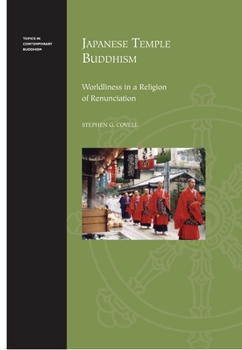Japanese Temple Buddhism: Worldliness in a Religion of Renunciation
(Part of the Topics in Contemporary Buddhism Series)
Select Format
Select Condition 
Book Overview
There have been many studies that focus on aspects of the history of Japanese Buddhism. Until now, none have addressed important questions of organization and practice in contemporary Buddhism, questions such as how Japanese Buddhism came to be seen as a religion of funeral practices; how Buddhist institutions envision the role of the laity; and how a married clergy has affected life at temples and the image of priests. This volume is the first to address fully contemporary Buddhist life and institutions--topics often overlooked in the conflict between the rhetoric of renunciation and the practices of clerical marriage and householding that characterize much of Buddhism in today's Japan. Informed by years of field research and his own experiences training to be a Tendai priest, Stephen Covell skillfully refutes this "corruption paradigm" while revealing the many (often contradictory) facets of contemporary institutional Buddhism, or as Covell terms it, Temple Buddhism.
Covell significantly broadens the scope of inquiry to include how Buddhism is approached by both laity and clerics when he takes into account temple families, community involvement, and the commodification of practice. He considers law and tax issues, temple strikes, and the politics of temple boards of directors to shed light on how temples are run and viewed by their inhabitants, supporters, and society in general. In doing so he uncovers the economic realities that shape ritual practices and shows how mundane factors such as taxes influence the debate over temple Buddhism's role in contemporary Japanese society. In addition, through interviews and analyses of sectarian literature and recent scholarship on gender and Buddhism, he provides a detailed look at priests' wives, who have become indispensable in the management of temple affairs.





